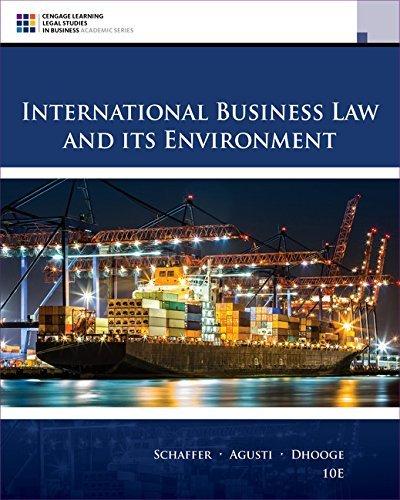Question:
RFE/RL, Inc., is a Delaware nonprofit
corporation that is funded but not controlled by the federal government. It is best known for its broadcast services, Radio Free Europe and Radio Liberty. RFE/RL's principal place of business is Munich, Germany. In 1982, the company entered into a collective bargaining agreement with unions representing its employees in Munich. One of the provisions of the labor contract, modeled after a nationwide agreement with the German broadcast industry, required employees to retire at age 65. After Congress amended the Age Discrimination in Employment Act (ADEA) to cover American citizens working for American corporations overseas, RFE/RL thought its American employees in Munich would no longer have to retire at the age of 65, as the collective bargaining agreement provided, and could continue to work if they chose. In order to implement this understanding, the company applied to the Works Council for limited exemptions from its contractual obligation. Rejecting RFE/RL's requests, the Works Council determined that allowing only those employees who were American citizens to work past the age of 65 would violate not only the mandatory retirement provision but also the collective bargaining agreement's provision forbidding discrimination based on nationality. RFE/RL appealed the Works Council's decisions with respect to the plaintiffs to the Munich Labor Court and lost. The Labor Court agreed with the Works Council that RFE/ RL must uniformly enforce the mandatory retirement provisions because exemptions would unfairly discriminate against German workers. The Labor Court also held that the company's retaining employees over the age of 65 despite the collective bargaining agreement would be illegal. The company terminated plaintiff De Lon in 1987 and plaintiff Mahoney in 1988. Both plaintiffs were working for the company in Munich, both were U.S. citizens, and both were discharged pursuant to the labor contract because they had reached the age of 65.
1. Does the court's decision mean that any collective bargaining agreement falls within the "foreign laws" exception? What if refusal to recognize CBA had been acceptable under German law?
2. Recalling the Denty court's comments about attempts to avoid the ADEA, why could it not be said that RFE/RL agreed to the CBA provision in order to circumvent the ADEA? When was the CBA entered into?
3. What does this decision reflect about courts' tendencies when faced with a potential conflict of laws?
Corporation
A Corporation is a legal form of business that is separate from its owner. In other words, a corporation is a business or organization formed by a group of people, and its right and liabilities separate from those of the individuals involved. It may...







